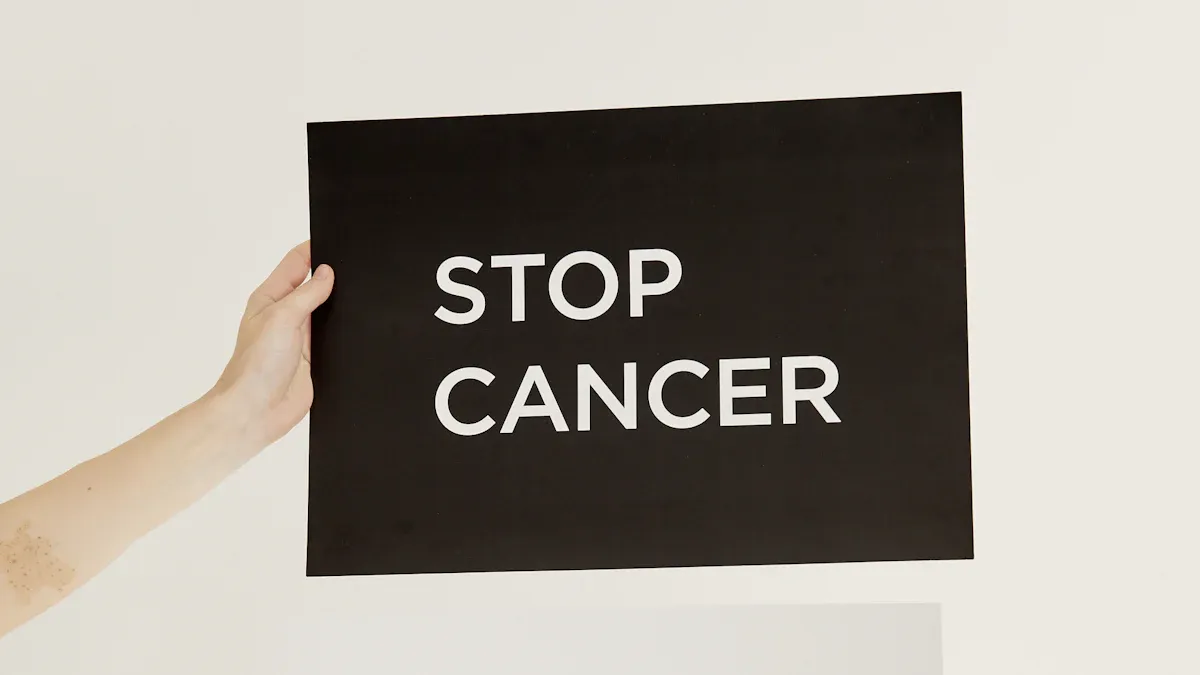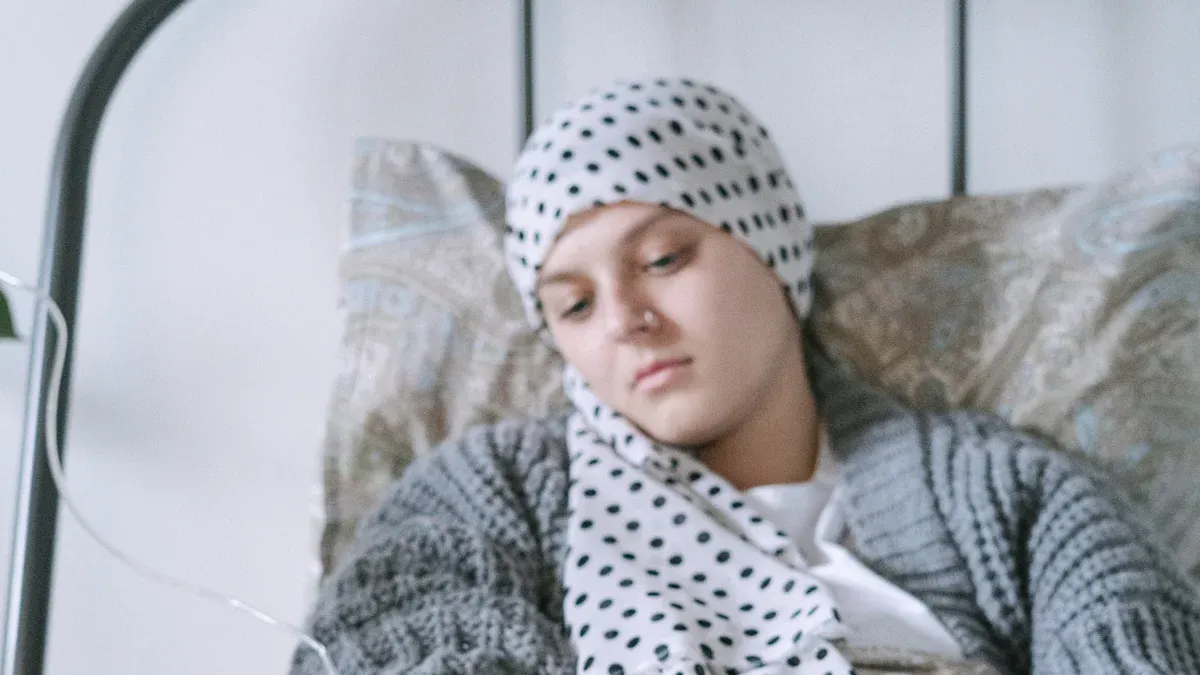Why Cancer Is Not the End of the Road

Hearing the word "cancer" can feel overwhelming, leading some to wonder, "Cancer is always a death sentence?" However, it’s crucial to understand that this is not the case. Medical breakthroughs have revolutionized cancer care, bringing hope to millions. Early detection and advanced treatments have made many cancers not only treatable but also curable.
Dr. Sandeep Nayak emphasizes that many cancers are now manageable and treatable, thanks to cutting-edge therapies and technologies that greatly enhance survival rates.
In fact, cancer mortality has been steadily declining, with over 4 million deaths prevented since 1991. These advancements clearly demonstrate that cancer is no longer the inevitable death sentence it was once perceived to be.
Key Takeaways
Cancer is not always deadly now. New treatments and early checks help many survive.
Getting checked often can find cancer early. This makes treatment work better. Take care of your health.
How you live matters. Eating healthy and staying active help recovery. They also lower cancer risk. Don’t smoke or drink too much alcohol.
Thinking positively and having support can make cancer easier. Be around kind people and helpful resources.
Many cancers can be treated or cured, especially if found early. Staying hopeful and strong can lead to a good life after diagnosis.
Cancer Is Always a Death Sentence?
Why This Belief Is Outdated
Improved survival rates due to medical advancements
You might think cancer is always a death sentence, but this belief no longer holds true. Millions of people worldwide survive cancer every year and go on to live fulfilling lives. Survival rates have steadily improved, especially in countries with advanced healthcare systems. According to a report in The Lancet, survival rates in affluent nations like the United States have risen significantly over the years.
Medical advancements have played a key role in this progress. Treatments like immunotherapy and targeted therapies are giving patients more options and better outcomes. For example, CAR-T-cell therapy has shown remarkable success, with some patients remaining in remission for over a decade. These breakthroughs prove that cancer is not the end of the road.
Examples of treatable and curable cancers
Certain cancers, when detected early, are highly treatable and even curable. Cancers like testicular cancer, thyroid cancer, and some forms of skin cancer have excellent survival rates. Early-stage breast and prostate cancers also respond well to treatment. These examples highlight how far medical science has come in transforming outcomes for patients.
The Role of Early Detection
How regular screenings save lives
Early detection can make all the difference. Regular screenings help identify cancer in its initial stages, when treatment is most effective. For instance, mammograms and colonoscopies have been proven to reduce mortality rates by catching cancer early.
Component of Early Detection | Impact on Cancer Mortality |
|---|---|
Early Diagnosis | |
Screening | Enhances treatment outcomes |
By staying proactive with your health, you can significantly improve your chances of survival.
Cancers with high survival rates when caught early
Many cancers have high survival rates when detected early. For example, localized breast cancer has a five-year survival rate of 99%. Similarly, early-stage melanoma and cervical cancer are highly treatable. These statistics challenge the outdated notion that cancer is always a death sentence.
Advances in Cancer Treatments
Targeted therapies and immunotherapy
Emerging treatments like targeted therapies and immunotherapy are revolutionizing cancer care. Targeted therapies focus on specific molecules involved in cancer growth, minimizing damage to healthy cells. Immunotherapy, on the other hand, boosts your immune system to fight cancer more effectively. Thousands of patients in England are now participating in trials for a new cancer vaccine designed to reduce recurrence risks.
Personalized medicine and its impact on outcomes
Personalized medicine tailors treatment to your unique genetic makeup. This approach increases the effectiveness of therapies and reduces side effects. By understanding your specific cancer type, doctors can create a treatment plan that offers the best possible outcome. These advancements show that cancer care is becoming more precise and hopeful than ever before.
The Importance of Early Detection and Lifestyle

Early Detection Saves Lives
Recognizing signs and symptoms
Paying attention to your body can make a significant difference. Symptoms like unexplained weight loss, persistent fatigue, or unusual lumps should never be ignored. These could be early warning signs of cancer. By recognizing these changes, you can take action before the disease progresses. Increased awareness in countries like Israel has led to earlier detection and better treatment outcomes.
The role of routine check-ups in catching cancer early
Routine check-ups are essential for catching cancer in its earliest stages. Regular screenings, such as mammograms or colonoscopies, can prevent thousands of deaths each year. Early detection significantly enhances the chances of successful treatment and long-term survival.
Nearly half of cancer deaths this year are linked to lifestyle choices, emphasizing the importance of prevention.
Regular cancer screenings can save lives by identifying cancer early.
Lifestyle Choices That Influence Prognosis
The impact of diet and exercise on recovery
Your lifestyle plays a crucial role in your recovery. A healthy diet and regular exercise can improve your overall health and positively impact treatment outcomes. Studies show that more than 15% of cancer cases are linked to excess body weight, physical inactivity, and unhealthy diets. By adopting healthier habits, you can improve your prognosis and quality of life.
Avoiding risk factors like smoking and excessive alcohol
Avoiding harmful habits like smoking and excessive alcohol consumption can reduce your risk of developing cancer. These behaviors are known to contribute to various cancers, making lifestyle changes a powerful tool in prevention. Many cancers could be prevented through simple, consistent lifestyle adjustments.
Preventative Measures
Vaccines like HPV and Hepatitis B
Vaccines are a game-changer in cancer prevention. The HPV vaccine, for instance, significantly reduces the risk of cervical and other HPV-related cancers. Data shows that immunized individuals have far fewer cancer cases compared to non-immunized groups.

Regular health monitoring and its benefits
Regular health monitoring helps you stay proactive. Routine blood tests, imaging scans, and physical exams can detect abnormalities early. This proactive approach ensures timely intervention, improving survival rates and outcomes.
Prevention is always better than cure. By taking these steps, you can protect yourself and your loved ones from the devastating effects of cancer.
The Role of Mindset and Support Systems

The Power of a Positive Mindset
How optimism can improve treatment outcomes
Your mindset can shape your journey through cancer. While optimism may not directly influence survival rates, it can significantly enhance your quality of life. Many survivors believe that staying positive improves their outlook and helps them cope better with treatment.
Mental health care for cancer patients has been linked to earlier diagnoses and better access to optimal treatments.
A study of over 50,000 veterans found that those receiving mental health support lived longer, even with lung cancer.
A positive attitude can make the experience of cancer more manageable and fulfilling.
By focusing on hope and resilience, you can navigate challenges with greater strength and clarity.
Techniques for managing stress and anxiety
Managing stress is essential for maintaining a positive mindset. Techniques like mindfulness meditation, deep breathing exercises, and journaling can help you stay grounded. Physical activities such as yoga or walking also reduce anxiety and improve your mood. Surrounding yourself with uplifting books, music, or podcasts can further inspire you to stay hopeful.
Building a Strong Support System
The role of family, friends, and caregivers
You don’t have to face cancer alone. Family, friends, and caregivers play a vital role in your recovery. They provide emotional support, help with daily tasks, and encourage you during tough times. Their presence can make you feel valued and understood, which boosts your mental well-being.
Support groups and community resources
Support groups connect you with others who share similar experiences. These groups offer a safe space to share your feelings, gain advice, and find encouragement. Community resources, such as counseling services or housing support, can also ease your journey.
Program Participation | Lower Risk of Death from Any Cause | Lower Risk of Death from Lung Cancer |
|---|---|---|
26% | 23% | |
Substance use treatment | 26% | 26% |
Housing support | 28% | 30% |
Employment support | 27% | 20% |

These resources demonstrate how a strong support system can improve recovery rates and overall well-being.
Inspiring Stories of Survival
Examples of individuals who overcame cancer
Stories of survival remind you that cancer is not the end of the road. For example, Lance Armstrong, a testicular cancer survivor, went on to win multiple Tour de France titles. Similarly, Robin Roberts, a breast cancer survivor, continues to inspire millions as a television host.
Lessons learned from their journeys
These individuals teach us the power of perseverance and hope. They show that even in the face of adversity, you can find strength and purpose. Their journeys prove that cancer is not always a death sentence but can be a chapter of growth and transformation.
Debunking Myths About Cancer
Myth: Cancer Is Always Fatal
Statistics showing improved survival rates
The belief that cancer is always fatal is outdated. Modern therapies and technologies have transformed cancer care, making many types of cancer manageable and treatable. Early detection plays a critical role in improving outcomes. For example, the five-year survival rate for breast cancer exceeds 90%, while prostate cancer boasts a survival rate of over 96%. These numbers highlight the progress made in cancer treatment and the importance of catching it early.
Educational disparities often contribute to the misconception that cancer is a death sentence.
Addressing these disparities can improve health outcomes and reduce fear.
Understanding that cancer is not an inevitable death sentence is vital for community health.
Examples of long-term cancer survivors
Many individuals have defied the odds and thrived after a cancer diagnosis. Survivors like Lance Armstrong and Robin Roberts have not only overcome cancer but also inspired millions with their resilience. Their stories prove that cancer is not the end of the road. With early detection and advanced treatments, you too can have hope for a brighter future.
Myth: Cancer Treatments Are Worse Than the Disease
Advances in reducing side effects
Modern cancer treatments are far less harsh than they used to be. Dr. Devaprasad Munisiddaiah, a minimally invasive surgical oncologist, emphasizes that therapies like immunotherapy and targeted treatments offer patients more options and hope. These advancements reduce side effects and improve recovery. Early detection also allows for less aggressive treatments, making the journey easier for patients.
The importance of individualized care
Personalized medicine tailors treatments to your unique needs. Doctors now use genetic information to create plans that maximize effectiveness while minimizing discomfort. This approach ensures that you receive the best possible care, proving that cancer treatments are no longer one-size-fits-all.
Myth: A Cancer Diagnosis Means Life Is Over
Stories of people thriving after cancer
A cancer diagnosis does not mean your life is over. Many survivors report that maintaining a positive attitude improves their quality of life. Participation in support groups enhances well-being and provides a sense of community. These stories show that life after cancer can be fulfilling and meaningful.
How cancer can lead to personal growth and new perspectives
Cancer often inspires personal growth. Survivors frequently discover new passions, strengthen relationships, and gain a deeper appreciation for life. Optimism and positivity can transform your outlook, helping you find purpose even in challenging times. Cancer is not just a battle; it can also be a journey of self-discovery and resilience.
Cancer is not the end of the road. Advancements in treatments, early detection, and support systems have transformed outcomes for millions. Early-stage cancers now have much higher survival rates, thanks to regular screenings and innovative therapies like immunotherapy and personalized medicine.
A study of over 50,000 veterans revealed that mental health support improved survival rates and reduced deaths by up to 30%.
Your mindset and support network play a vital role in recovery. By staying proactive and embracing hope, you can navigate this journey and live a fulfilling life.
FAQ
What should you do after a cancer diagnosis?
Take a deep breath and focus on gathering information. Consult your doctor to understand your diagnosis and treatment options. Seek a second opinion if needed. Build a support system of family, friends, or support groups. Staying informed and proactive can help you feel more in control.
Can lifestyle changes improve your chances of recovery?
Yes, adopting a healthy lifestyle can make a difference. Eating nutritious foods, staying active, and avoiding harmful habits like smoking can boost your overall health. These changes can also improve your body’s ability to respond to treatments and enhance your quality of life.
Is cancer always a death sentence?
No, this belief is outdated. Many cancers are treatable, especially when detected early. Advances in medicine have improved survival rates significantly. With early detection, innovative treatments, and a positive mindset, you can overcome cancer and live a fulfilling life.
How can you support a loved one with cancer?
Offer emotional support by listening and being present. Help with daily tasks or accompany them to appointments. Encourage them to join support groups or seek counseling. Your care and understanding can make their journey less overwhelming and more hopeful.
Are there resources available for cancer patients?
Yes, many organizations provide resources like financial aid, counseling, and housing support. Hospitals often have social workers who can guide you to these services. Support groups and online communities also offer valuable advice and encouragement.
See Also
An In-Depth Overview of Various Cancer Types
Recognizing Symptoms and Causes of Esophageal Cancer
Symptoms and Treatment Options for Duodenal Cancer

